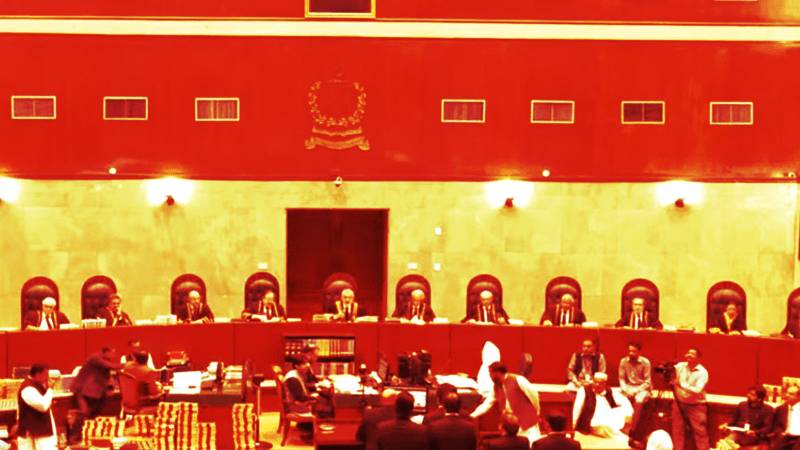
The Supreme Court (Practice and Procedure) Act 2023, a contentious law that aims to limit the chief justice of Pakistan’s suo motu powers, was challenged in a series of petitions, and the full court of the apex court comprises all 15 judges permitted live telecast of the proceedings for the first time in the country’s judicial history.
Chief Justice of Pakistan (CJP) Qazi Faez Isa-led full court heard the petitions.
The petitions asking for a full court hearing on the petitions were deemed acceptable by the Supreme Court. According to CJP Isa, the decision to hold a full court hearing was taken in the full court meeting. CJP Isa stated at the hearing that since a new bench has been constituted, the case's arguments will start over.
CJP Isa noted that three pleas seeking the formation of a full court had been approved.
Attorney General for Pakistan (AGP) Mansoor Usman Awan provided the federal government's response in the case, urging the court to reject the pleas challenging the SC Practice and Procedure Act.
"Petitions against acts of the parliament are not permitted. The government's response stated that the petitions challenging the SC Practice and Procedure Act should be dismissed."
The full court was constituted by newly-appointed Chief Justice of Pakistan Qazi Faez Isa and includes Justice Sardar Tariq Masood, Justice Ijazul Ahsan, Justice Syed Mansoor Ali Shah, Justice Munib Akhtar, Justice Yahya Afridi, Justice Aminuddin Khan, Justice Sayyed Mazahar Ali Akbar Naqvi, Justice Jamal Khan Mandokhel, Justice Muhammad Ali Mazhar, Justice Ayesha A. Malik, Justice Athar Minallah, Justice Syed Hasan Azhar Rizvi, Justice Shahid Waheed, and Justice Musarrat Hilali.
The CJP noted at the beginning of the hearing that there were nine petitions and asked Advocate Khawaja Tariq Rahim to present his arguments.
Rahim was instructed to read the Act and "forget the past" by the CJP.
Justice Ayesha questioned the lawyer about the impact of Section 5, which grants the right to appeal.
She remarked, "Given that the matter would be heard by the entire bench, will the appeal not be considered?"
Rahim referred to the Practice Act when he remarked, "Parliament formed a committee of three judges to decide on matters of public interest."
What does Article 191 of the Constitution state, Justice Mandokhail inquired? "The Constitution empowers Parliament to legislate," Khawaja said, adding that the Supreme Court had made its rules through the full court.
Justice Mansoor made the following statement as the Act was being read aloud: "What I understand of your point is that if all of this is done by the full court, then it is acceptable; if Parliament does this, then it is wrong."
"Can the law override the Chief Justice's authority? Judge Musrat inquired.
In response, Justice Mandokhail questioned if the act eliminated the Supreme Court's or the Chief Justice's authority.
If the chief justice has unrestricted authority to appoint a bench, are you satisfied? Justice Athar questioned.
He remarked, "Why can't three judges sit and interpret the Constitution? The CJP retorted that only the quantity and not the judges' qualifications were being mentioned in the Act.
The CJP emphasized that the lawyer should write down any important concerns so that they may be addressed later since several significant queries about the legitimacy and power of parliament were raised.
"My colleagues are asking you good questions," he said, asking the lawyer to take his time in responding to them.
Additionally, the CJP warned counsel Raheem to stick to the law and chastised him for using his "personal opinion" throughout the arguments.
Talk about the law, not your "personal opinion," the CJP said.
He said, "Whose rights can be taken away by this law?"
The Supreme Court (SC) has taken a short break, and the hearing will be resumed shortly.

